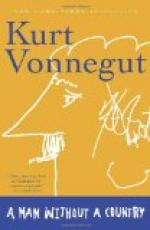I have heard it said that he was with Porter when he took possession of the Nukahiwa Islands. Not this Porter, you know, but old Porter, his father, Essex Porter,—that is, the old Essex Porter, not this Essex. [Note 9] As an artillery officer, who had seen service in the West, Nolan knew more about fortifications, embrasures, ravelins, stockades, and all that, than any of them did; and he worked with a right good-will in fixing that battery all right. I have always thought it was a pity Porter did not leave him in command there with Gamble. That would have settled all the question about his punishment. We should have kept the islands, and at this moment we should have one station in the Pacific Ocean. Our French friends, too, when they wanted this little watering-place, would have found it was preoccupied. But Madison and the Virginians, of course, flung all that away.
All that was near fifty years ago. If Nolan was thirty then, he must have been near eighty when he died. He looked sixty when he was forty. But he never seemed to me to change a hair afterwards. As I imagine his life, from what I have seen and heard of it, he must have been in every sea, and yet almost never on land. He must have known, in a formal way, more officers in our service than any man living knows. He told me once, with a grave smile, that no man in the world lived so methodical a life as he. “You know the boys say I am the Iron Mask, and you know how busy he was.” He said it did not do for any one to try to read all the time, more than to do anything else all the time; and that he used to read just five hours a day. “Then,” he said, “I keep up my notebooks, writing in them at such and such hours from what I have been reading; and I include in these my scrap-books.” These were very curious indeed. He had six or eight, of different subjects. There was one of History, one of Natural Science, one which he called “Odds and Ends.” But they were not merely books of extracts from newspapers. They had bits of plants and ribbons, shells tied on, and carved scraps of bone and wood, which he had taught the men to cut for him, and they were beautifully illustrated. He drew admirably. He had some of the funniest drawings there, and some of the most pathetic, that I have ever seen in my life. I wonder who will have Nolan’s scrapbooks.
Well, he said his reading and his notes were his profession, and that they took five hours and two hours respectively of each day. “Then,” said he, “every man should have a diversion as well as a profession. My Natural History is my diversion.” That took two hours a day more. The men used to bring him birds and fish, but on a long cruise he had to satisfy himself with centipedes and cockroaches and such small game. He was the only naturalist I ever met who knew anything about the habits of the house-fly and the mosquito. All those people can tell you whether they are Lepidoptera or Steptopotera;




